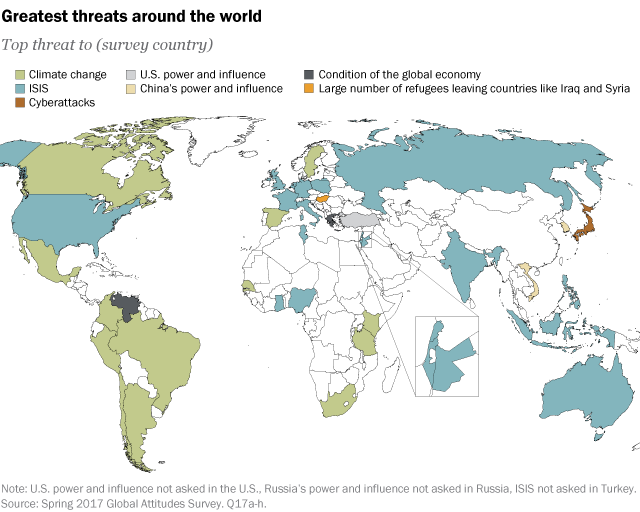
Siber Saldırı Tehdidi
Küresel olarak, İnsanlar ISIS'e ve İklim Değişikliğine Başlıca Güvenlik Tehditlerine Dikkat Ediyor
Siber saldırılar hakkında endişe, dünya ekonomisinde de yaygın
Yeni Pew Research Center anketine göre, dünya genelindeki insanlar ISIS ve iklim değişikliğini ulusal güvenlik için önde gelen tehdit olarak tanımlıyor. Anket, sekiz olası tehdit hakkında sordu. Endişe seviyesi ve odak noktası bölgeye ve ülkeye göre değişirken, ISIS ve iklim değişikliği açıkça ortaya çıkıyor çünkü 38 ülke çapında en çok belirtilen güvenlik riski taşıyor.
Anket yapılan toplam 18 ülkede ISIS, çoğunlukla Avrupa, Orta Doğu, Asya ve Amerika'da yoğunlaşan en büyük tehdit olarak adlandırıldı. Bu ülkelerin önemli bir kısmı İslamcı militanın öne sürdüğü ölümcül terör saldırılarına katlandı.
Çoğunlukla Latin Amerika ve Afrika'daki 13 ülkede, küresel iklim değişikliği en üst tehdit olarak görülüyor. Diğer birçok ülkede ikinci dereceden endişe şu an yok.
Diğer ülkelerden gelen siber saldırılar ve küresel ekonominin durumu, küresel medyan tarafından her biri% 51'lik büyük tehdit olarak adlandırılır. Siber saldırılar Japonya'daki en büyük endişe ve ABD, Almanya ve İngiltere gibi son aylarda bu türden yüksek profilli saldırılar düzenlenen yerlerde ikinci sırada.
Yunanistan ve Venezuela'daki insanlar, uluslararası ekonominin sağlığını belki de bu ülkelerin son yıllardaki ekonomik mücadelelerini yansıtan ülkelerinde önde gelen tehdit olarak görüyorlar. Ortadoğu ve Latin Amerika'da araştırılan birçok ülke ekonomik krizin en büyük ikinci endişesi olduğunu belirtti.
2016 yılında Avrupa'da özellikle endişe duyan mültecilerin akını, 38 ülke çapında% 39'luk bir ortanca tehdit olarak görülüyor. Ancak, sadece bir ülkede en büyük tehdittir: Macaristan.
Küresel olarak, yaklaşık üçte bir ortalama, ABD, Rusya veya Çin'in güç ve etkisini büyük bir tehdit olarak görüyor. Amerika'nın etkisi Türkiye'deki en büyük endişelerdir.1 Ve Güney Kore ve Vietnam'da, ondan sekiz veya daha fazlası, Çin'in büyük bir tehdit olarak gücü ve nüfuzudur. Bu arada, anket yapılan ülkeler arasında Rusya'nın korkuları Polonya'da en akut.
İngilizce Metin
Globally, People Point to ISIS and Climate Change as Leading Security Threats
Concern about cyberattacks, world economy also widespread
People around the globe identify ISIS and climate change as the leading threats to national security, according to a new Pew Research Center survey. The survey asked about eight possible threats. While the level and focus of concern varies by region and country, ISIS and climate change clearly emerge as the most frequently cited security risks across the 38 countries polled.
ISIS is named as the top threat in a total of 18 countries surveyed – mostly concentrated in Europe, the Middle East, Asia and the United States. A substantial number of these countries have endured deadly terrorist attacks claimed by the Islamic militant group.
In 13 countries, mostly in Latin America and Africa, publics identify global climate change as the topmost threat. It is the second-ranked concern in many other countries polled.
Cyberattacks from other countries and the condition of the global economy are named as major threats by global medians of 51% each. Cyberattacks are the top concern in Japan and second-highest concern in places such as the U.S., Germany and the UK, where there have been a number of high-profile attacks of this type in recent months.
People in Greece and Venezuela view the health of the international economy as the leading threat to their countries, perhaps reflecting these nations’ economic struggles in recent years. Many countries surveyed in the Middle East and Latin America name economic turmoil as their second-greatest concern.
The influx of refugees, which was of particular concern in Europe in 2016, is seen as a major threat by a median of 39% across the 38 countries. It is the top threat in only one country, however: Hungary.
Globally, a median of about one-third view the power and influence of the U.S., Russia or China as a major threat. America’s influence is a top concern in Turkey.1 And in South Korea and Vietnam, eight-in-ten or more name China’s power and influence as a major threat. Meanwhile, among the countries surveyed, fears of Russia are most acute in Poland.
